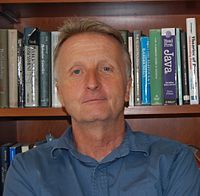Eric Turkheimer
Eric Nathan Turkheimer Ph.D. | |
|---|---|
 | |
| Nationality | American |
| Occupation | Professor of psychology |
| Known for | Behavior genetics, Gene-environment interactions |
| Title | Hugh Scott Hamilton Professor of psychology |
| Spouse | Carol Manning |
| Academic background | |
| Alma mater | University of Texas at Austin |
| Thesis | Cognitive development of adopted and fostered children (1986) |
| Doctoral advisor | John Loehlin |
| Influences | Irving Gottesman |
| Academic work | |
| Discipline | Psychology, Behavior Genetics |
| Sub-discipline | GxSES |
| Institutions | University of Virginia |
Eric Nathan Turkheimer is the Hugh Scott Hamilton Professor of psychology at the University of Virginia.
Education and career
Turkheimer received his B.A. in psychology from Haverford College in 1976 and his Ph.D. in clinical psychology from the University of Texas at Austin in 1986. Also in 1986, he joined the faculty of the University of Virginia, where he became an associate professor in 1992 and a full professor in 2001.[1]
Research
Turkheimer is known for studying the effects of socioeconomic status and genes on IQ, especially in regards to gene-environment interactions. For example, in a 2003 study, he and his colleagues found that the environment accounted for about 60% of the variance in IQ among low-income children, while genes accounted for almost none of it. In contrast, this study also found that the reverse was true for wealthy children.[2][3][4][5][6] Since then, along with his University of Virginia colleague David Fask, he has published other studies that also suggest that IQ is more heritable among wealthy families than among poor ones.[7] In a 2011 commentary about environmental influences on human behavior, he wrote that “The nonshared environment, in a phrase, is free will. Not the kind of metaphysical free will that no one believes in anymore, according to which human souls float free above the mechanistic constraints of the physical world, but an embodied free will, tethered to biology, that encompasses our ability to respond to complex circumstances in complex and unpredictable ways and in the process to build a self.”[8]
References
- ^ "Eric Turkheimer Curriculum Vitae".
- ^ Turkheimer, E; Haley, A; Waldron, M; D'Onofrio, B; Gottesman, II (November 2003). "Socioeconomic status modifies heritability of IQ in young children". Psychological Science. 14 (6): 623–8. PMID 14629696.
- ^ Benson, E.S. (2004). "Heritability: it's all relative". Monitor on Psychology. American Psychological Association (published 2004-04-01).
- ^ Gopnik, Alison (2013-09-20). "Poverty Can Trump a Winning Hand of Genes". The Wall Street Journal.
- ^ Ridley, Matt (2012-06-22). "Is IQ in the Genes? Twins Give Us Two Answers". The Wall Street Journal.
- ^ Kirp, David L. (2006-07-23). "After the Bell Curve". New York Times Magazine.
- ^ "In the Red". Virginia Magazine. 2011.
- ^ Drake, Nadia (2013-05-09). "What You Do Is Who You Are". National Geographic.
External links
- Faculty page
- Eric Turkheimer publications indexed by Google Scholar
